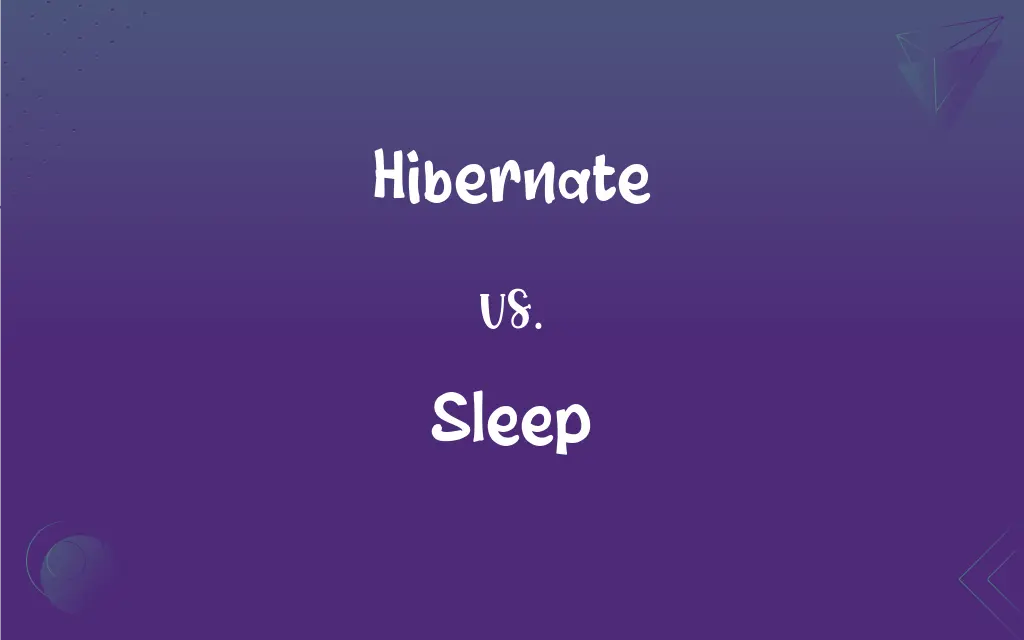Hibernate vs. Sleep: What's the Difference?
Edited by Aimie Carlson || By Janet White || Published on January 17, 2024
Hibernate involves a deeper, longer power-saving state for computers, while sleep mode allows for quick resumption by keeping data in RAM.

Key Differences
In computing, hibernation is a power-saving state that allows a computer to save its current state to a hard disk, completely shutting down the system. Sleep mode, on the other hand, is a lighter form of power saving where the computer enters a low-power state, keeping the session in RAM.
Hibernate mode is suitable for extended periods of inactivity, as it does not consume battery or power. Sleep mode, however, consumes a small amount of power to keep the session active in RAM, making it ideal for short breaks.
On resuming from hibernation, the computer needs to read the saved state from the hard disk, which takes longer than waking from sleep mode. In sleep mode, since the data is kept in RAM, the system wakes up more quickly.
Data safety is higher in hibernation since the session is saved on the hard disk. In sleep mode, a loss of power means loss of unsaved data, as RAM is volatile.
Hibernate mode requires as much disk space as the RAM size for storing the session, whereas sleep mode does not require additional disk space.
ADVERTISEMENT
Comparison Chart
Power Consumption
Zero, as the computer shuts down
Minimal, maintains RAM power
Resume Time
Longer, needs to read from disk
Quicker, data retained in RAM
Suitable Duration
Long periods of inactivity
Short breaks
Data Safety
Higher, saves session to disk
Lower, vulnerable to power loss
Disk Space Requirement
Requires disk space equal to RAM
No additional disk space required
ADVERTISEMENT
Hibernate and Sleep Definitions
Hibernate
To spend extended periods in a dormant or inactive state.
The plant seems to hibernate in harsh conditions, pausing its growth.
Sleep
To rest in a dormant or inactive state.
The computer goes to sleep after ten minutes of inactivity.
Hibernate
In zoology, a state of inactivity and metabolic depression in animals during winter.
Bears hibernate during the cold months to conserve energy.
Sleep
A condition of body and mind such as that which typically recurs for several hours.
A good night's sleep is crucial for health.
Hibernate
To enter a dormant state in computing, saving the current session to disk.
My laptop automatically hibernates after 30 minutes of inactivity.
Sleep
To be inactive or dormant.
The seeds will sleep in the soil until spring.
Hibernate
To temporarily withdraw from activities or social contact.
I plan to hibernate this weekend and catch up on some reading.
Sleep
To be in a state of rest where consciousness is suspended.
The baby will sleep for hours during the day.
Hibernate
In software development, Hibernate is an object-relational mapping tool for Java.
We use Hibernate to map our Java classes to database tables.
Sleep
A natural, recurring state of mind and body characterized by altered consciousness.
I need eight hours of sleep to function properly.
Hibernate
To be in a dormant or torpid state during a cold period, especially during the winter.
Sleep
A natural periodic state of rest for the mind and body, in which the eyes usually close and consciousness is completely or partially lost, so that there is a decrease in bodily movement and responsiveness to external stimuli. During sleep the brain in humans and other mammals undergoes a characteristic cycle of brain-wave activity that includes intervals of dreaming.
Hibernate
To be in an inactive or dormant state or period
"In Lawrenceville people hibernated and life passed them by" (Jacqueline Susann).
FAQs
Is hibernation better for long-term computer inactivity?
Yes, it's better for long periods as it doesn't consume power.
Does hibernation take longer to resume from?
Yes, it takes longer as the computer needs to read the saved state from the disk.
What is hibernation in computers?
It's a state where the computer saves its current state to the hard disk and shuts down.
How is sleep mode different from hibernation?
Sleep mode keeps the computer in a low-power state with the session in RAM, while hibernation saves the session to disk and powers down.
Is sleep mode safe for short breaks?
Yes, it's ideal for short periods of inactivity.
Can data be lost in sleep mode?
Yes, if there's a power loss, since data is stored in volatile RAM.
Does waking from sleep mode require a password?
It depends on your system settings, but usually, it does for security.
Does hibernation require a lot of disk space?
Yes, it requires disk space equivalent to the RAM size.
Can I configure my computer to automatically enter sleep or hibernation?
Yes, most operating systems allow you to set automatic sleep or hibernation times.
Is hibernation suitable for laptops?
Yes, especially to conserve battery power for extended periods.
Does hibernation affect computer performance?
No, it doesn't affect performance as the state is saved and completely shut down.
What is REM sleep?
REM (Rapid Eye Movement) sleep is a deep sleep phase where dreams occur.
Is oversleeping harmful?
Yes, oversleeping can be associated with health problems like heart disease.
Is sleep mode quick to resume?
Yes, it's quicker as the session is kept active in RAM.
What happens to running applications during hibernation?
They are saved to the disk along with the system state and resume upon waking up.
Are there health risks associated with disrupted sleep in humans?
Yes, disrupted sleep can lead to various health issues like fatigue and concentration problems.
Can computers enter sleep mode during active tasks?
Generally, no. Active tasks usually prevent automatic sleep mode.
Can I lose unsaved work in sleep mode?
Yes, if there's a power outage or battery drain.
Can animals also hibernate?
Yes, many animals hibernate to conserve energy during cold months.
Does the Hibernate feature exist on all computers?
Most modern computers support hibernation, but it depends on the operating system and hardware.
About Author
Written by
Janet WhiteJanet White has been an esteemed writer and blogger for Difference Wiki. Holding a Master's degree in Science and Medical Journalism from the prestigious Boston University, she has consistently demonstrated her expertise and passion for her field. When she's not immersed in her work, Janet relishes her time exercising, delving into a good book, and cherishing moments with friends and family.
Edited by
Aimie CarlsonAimie Carlson, holding a master's degree in English literature, is a fervent English language enthusiast. She lends her writing talents to Difference Wiki, a prominent website that specializes in comparisons, offering readers insightful analyses that both captivate and inform.






































































